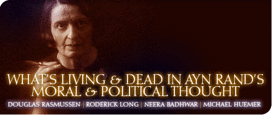I too love the passage from Cicero that Doug quoted. But I did not see it as supporting either Doug (and me) or Roderick on the issue of the possibility of a conflict among different people’s rational interests. Although I have agreed with most of Roderick’s views so far, I am now making up by disagreeing with him on two of the three points he makes in his latest!
Roderick says that there is no “fundamental” conflict between one person’s good and another’s. I don’t know what rides on “fundamental,” but it seems to be a qualification to the thesis that there can be no conflicts between two people’s rational interests, the thesis affirmed by Rand and Objectivists. At any rate, I think there can also be fundamental conflicts. Here are some simple everyday examples: (i) there are two equally good candidates for one job — equally qualified and equally good for the business/department. The one who loses out gets stuck in a really awful job for several years that takes the joy out of work. It’s no good saying that there cannot be two equally good candidates for a job — I’ve witnessed this sort of situation more than once. (Of course, people then try to invent reasons for why one is better than the other, but they’re just that — inventions! There is oodles of experimental evidence for this kind of rationalization.) (ii) Two people invent the same thing at the same time, but only the one who reaches the patent office first gets the patent (she lives closer to the patent office). Now you could say that our patent laws are irrational, and the thesis of the harmony of rational interests applies only to situations not created by irrational factors. I’m not sure Rand thought our patent laws were irrational, but in any case, the first example does not depend on a situation created by irrational factors. Indeed, like I said earlier, I think even our own rational interests can conflict. Here’s an example that shows both intrapersonal and interpersonal conflict: (iii) the best location for my career, in which I am heavily invested, is P, the best location for my husband, in which he is heavily invested, is R, we both want each other to flourish in their careers, and we are both equally interested in living together. But neither of us can satisfy all of our interests.
The idea that rational interests cannot conflict assumes that the rational constraints on desire/need are no different from the rational constraints on belief: all rational wants must harmonize just as all true beliefs must harmonize (see Ronald de Sousa, “The Good and the True” [pdf]). But there is no good reason to believe this. In the face of conflict, It is rational to prioritize and try to make the best of the situation, but it’s not rational to pretend that there never was a conflict — and, therefore, no room for rational regret, sadness, frustration, or unhappiness.
On Happiness and Virtue
Roderick argues that “choice situations that destroy our capacity for happiness” are not a problem for the Aristotelian view because it does not hold that “virtue is sufficient for happiness or that happiness consists solely in conscious occurrent feelings.” I agree, but my argument did not assume either of these things. Rather, given the very real possibility of such situations, I believe it is false to hold that (i) doing the right thing is always better for us, where this means that it must contribute more to our happiness than doing the wrong thing (a view that, according to Irwin and others, Aristotle does hold), where (ii) where happiness includes both the objective worth of one’s life as a whole, and the psychological disposition to enjoy this life. I don’t think that enjoyment of life, joy in life, capacity for pleasure etc. can be subtracted from happiness without changing the very concept of happiness. Our philosophical concepts have to be “descriptively plausible,” that is, match up with the way they are ordinarily used. Moreover, Aristotle’s own conception of happiness is descriptively plausible in this way. The problem I was pointing to in my earlier post on this issue is that he (and the Stoics and Rand) do not face up to the possibility of the kind of terrible situation I was envisaging, that of destruction of the very capacity for such enjoyment. Of course, doing the wrong thing can also destroy the very capacity for enjoyment through shame and guilt. In that case, it is as bad for us as doing the right thing, but still not worse, or not necessarily so. In my earlier post, I also pointed to another possibility illustrated by Swing Kids: the destruction of the very capacity for doing the right thing as a result, in part, of doing the right thing.
None of this is meant to suggest that naturalism doesn’t work (as, I think, Doug thought I was suggesting). Rather, it’s meant to show that Aristotelian naturalism needs to be modified to take account of such cases.

